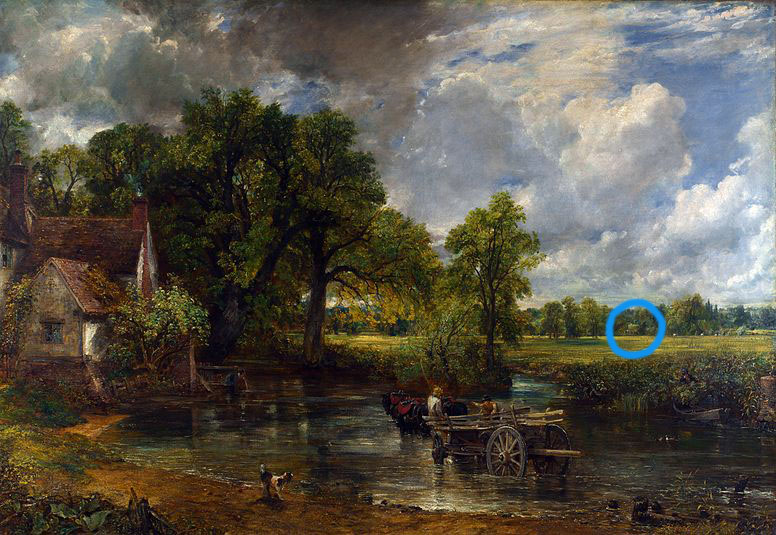Constable’s Haywain is a famously popular painting.
It’s a chocolate-box idyll of rural English life
Isn’t it?
In some important ways, Constable was a true radical.
His ‘ rough‘ painting techniques have been described as an important precursor to Impressionism.
And he transformed landscape painting. Moving it away from classical Italy towards the English countryside
But his views of that countryside seem to idealise peasant workers at a time when soldiers were returning from the Napoleonic wars – to nothing. At a time when agricultural mechanisation – with subsequent unemployment – is starting. And when towns are rapidly industrialising – sucking people out of the countryside.
This all comes to a head in The Haywain
Of course, the painting actually includes two Haywains. Off in the rear distance – as you can see circled in blue up above – there is another Haywain: nearly full and soon needing to be downloaded in the barn behind our first Haywain.
Constable is famous for his meteorological accuracy. And the dark grey clouds clearly show that this is definitely not a relaxed scene. It’s going to rain. Quite soon. Wet hay left in the field will rot. But If wet hay is brought into a barn, it may go mouldy with ergot – which can cause fatal poisoning.
So I don’t believe that the man driving the Haywain is relaxing. He knows he needs to get his vehicle up across the ford, to get back up to the harvesting that’s going on.
Even when the weather is good, I doubt that this man is exactly relaxed. There were ‘Bread or Blood’ riots locally just a few years before The Haywain was painted. It was caused by extreme climate changes. Just like the whole world – including Britain – is increasingly experiencing.
There were more riots the year after The Haywain was painted.
Our ‘happy Waggonner’ might well be one of the rioters.
Constable was from a rich family and I don’t believe he would ever have experienced hunger.
Unlike the men he painted.
Have a look at Prof Richard Marggraf Turley’s TEDx talk, or his book, if you want more detail.
He is clear that: “We need to be better readers of the past so we can make better, more informed, more humane decisions about the future”.
